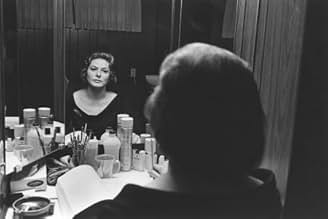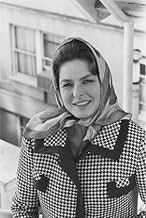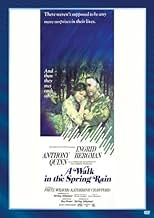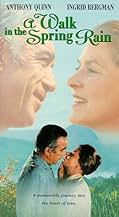The Merediths move to an isolated farm. Mrs. Meredith and the neighbour Will Cade become friends and anticipate becoming lovers.The Merediths move to an isolated farm. Mrs. Meredith and the neighbour Will Cade become friends and anticipate becoming lovers.The Merediths move to an isolated farm. Mrs. Meredith and the neighbour Will Cade become friends and anticipate becoming lovers.
- Director
- Writers
- Stars
Tom Holland
- Boy
- (as Tom Fielding)
Michael Bullock
- One of men in fight crowd
- (uncredited)
Janet Nelson Chadwick
- Singer at Festival
- (segment "Oh Shenandoah")
- (uncredited)
- Director
- Writers
- All cast & crew
- Production, box office & more at IMDbPro
6.01K
1
2
3
4
5
6
7
8
9
10
Featured reviews
10MacNessa
A tender romance torn apart by the actions of selfish offspring
How easy it is for the children to take their parents for granted? The key moment in the film is when the mother character(Ingrid Bergman) asks her daughter, if she has ever thought about her mother as a person. This is in response to her daughter's request that she leave her Smokey Mountains paradise(and new found love), so that she can take care of her grandchild while her daughter can be free to pursue her own law career. At the same time Anthony Quinn- Bergman's lover, is presented with a similar situation with his brutish son, who eyes the blossoming relationship with growing hostility. This is probably the main theme in this wonderfully shot and pleasantly paced drama. By todays standards the ending may be a little sad, but its far more realistic.
Three divergent accents adrift in the Smoky Mountains...
Admirers of classic films will no doubt enjoy seeing Anthony Quinn reunited with Ingrid Bergman, his co-star from 1964's "The Visit"; they're an interesting screen match, but here, in 1970, with handyman Quinn talking in a southern drawl and matronly Bergman playing a professor's wife living on a farm in Tennessee, one cannot help but feel a sense of central dislocation. Bergman's husband (American actor Fritz Weaver) takes a year off from teaching to write a textbook, but instead stares at his typewriter, pipe firmly stuck between his teeth (his wife isn't frigid, but he is). It's no wonder then that Bergman enjoys Quinn's advances, but since they're both married--and have problems with their selfish children besides--it's hardly a December-age romance. Dreary melodrama, adapted from the book by Rachel Maddux, with clumsy exposition and even clumsier attempts to modernize an old formula. Charles Lang's cinematography is a visually jarring mix of location shots, back projection and ugly sets, while miscast Quinn is overly-friendly and solicitous (he makes the audience as uncomfortable as Ingrid's chilly spouse). While it's good to see the two stars together again, this Smoky Mountains scenario is a drag: colorlessly staged, poorly-conceived, predictable and depressing. ** from ****
Beautiful performances
After Ingrid Bergman finally won a highly coveted Hot Toasty Rag award for her work in The Visit, she teamed up with Anthony Quinn again and earned another nomination for A Walk in the Spring Rain. They had such wonderful, intense energy together, and in this romance they both had the opportunity to play against type. Ingrid's character was a housewife who'd spent her life giving all of herself to other people. Tony played someone quiet, tender, and sweet.
Ingrid's husband, Fritz Weaver, is a professor, and for his sabbatical, they've decided to rent a cabin in the country so he can have the peace and quiet to write a book. Fritz is intelligent, opinionated, highbrow, and rather cold. Ingrid comes to life in her new country surroundings, and as she learns to love gardening, walking in nature, and caring for animals, she also develops a friendship with the cottage caretaker: Anthony Quinn. Tony is simple, earthy, and although he has passion, he isn't demonstrative. Both he and Ingrid are married, but they can't deny the deep feelings that continue to grow.
I know you're already out searching for a copy of A Walk in the Spring Rain, but there's a warning that comes with my recommendation. This is a drama. Yes, you'll see Ingrid looking cuter than she's ever looked, frolicking with baby deer and sheep, and Tony picks flowers for her; but something happens in this movie that's very upsetting. I won't tell you what it is or when it happens, but there is a "too good to be true" aura that surrounds the story. And when something seems too perfect. . . Well, just don't go into this movie thinking it's another Indiscreet. I loved the movie, and as a member of the Hot Toasty Rag board, I cast my vote for Ingrid, but I'm not sure I'd be able to sit through it again.
Kiddy Warning: Obviously, you have control over your own children. However, due to adult content, I wouldn't let my kids watch it.
Ingrid's husband, Fritz Weaver, is a professor, and for his sabbatical, they've decided to rent a cabin in the country so he can have the peace and quiet to write a book. Fritz is intelligent, opinionated, highbrow, and rather cold. Ingrid comes to life in her new country surroundings, and as she learns to love gardening, walking in nature, and caring for animals, she also develops a friendship with the cottage caretaker: Anthony Quinn. Tony is simple, earthy, and although he has passion, he isn't demonstrative. Both he and Ingrid are married, but they can't deny the deep feelings that continue to grow.
I know you're already out searching for a copy of A Walk in the Spring Rain, but there's a warning that comes with my recommendation. This is a drama. Yes, you'll see Ingrid looking cuter than she's ever looked, frolicking with baby deer and sheep, and Tony picks flowers for her; but something happens in this movie that's very upsetting. I won't tell you what it is or when it happens, but there is a "too good to be true" aura that surrounds the story. And when something seems too perfect. . . Well, just don't go into this movie thinking it's another Indiscreet. I loved the movie, and as a member of the Hot Toasty Rag board, I cast my vote for Ingrid, but I'm not sure I'd be able to sit through it again.
Kiddy Warning: Obviously, you have control over your own children. However, due to adult content, I wouldn't let my kids watch it.
Bergman and Quinn
Libby Meredith (Ingrid Bergman) is the dutiful wife of college professor Roger Meredith. They are traditional and do not approve of their daughter's personal pursuit away from her family obligations. Roger is on sabbatical writing a book. The couple leaves New York City for the country where Libby finds flirtatious neighbor Will Cade (Anthony Quinn).
There is a promise of an epic romance. It has the great pairing of Bergman and Quinn. It should be incredible. Libby as a conservative matriarch is set up to join the sexual revolution. I like the conflict between mother and daughter. I don't buy Anthony Quinn as an American, let alone a southerner. This should be a battle for Libby's heart and mind by the two men. There is a sudden twist that short-circuits the confrontation. In short, I don't like the twist which comes out of nowhere. Otherwise, the two leads and the premise provide interesting viewing.
There is a promise of an epic romance. It has the great pairing of Bergman and Quinn. It should be incredible. Libby as a conservative matriarch is set up to join the sexual revolution. I like the conflict between mother and daughter. I don't buy Anthony Quinn as an American, let alone a southerner. This should be a battle for Libby's heart and mind by the two men. There is a sudden twist that short-circuits the confrontation. In short, I don't like the twist which comes out of nowhere. Otherwise, the two leads and the premise provide interesting viewing.
Two seemingly mismatched couples
This is a bittersweet tale of two people from different worlds who fall in love and are unhappily married to others. Ingrid Bergman and Anthony Quinn make this story poignant, well-acted and believable.
It's love at first sight for Quinn as he comes out the box, swinging and pitching in his attraction for her. Honestly, it's just a little unsettling him always popping up, being a corn-pone chatterbox, subtly moving in with the compliments and lingering looks. He comes out the gate heated; but who can blame him. It's Ingrid Bergman he's fancying. And she slowly simmers as her attraction grows for the Tennessee mountain man Quinn plays. She's the wife of a University professor ( Fritz Weaver. ) Nice guy, good provider, but you know the type: he's no ogre, but he's staid, pedantic, and definitely not romantic. As she is throughout her career in films, Bergman is the one to watch. Her characters are so full of life if only allowed to break free.
You know how unfair, biased, skewed and stark movies present choices when they pit Marriage vs the Love Affair. We've seen it time and time again ( "The Arnelo Affair", "There's Always Tomorrow", etc. ) Well this movie is no different. Quinn's wife (played by Virginia Gregg ) is as drab and as sexless as Bergman is glamorous and sensual. It's difficult to conjure up why there was even an attraction between them ( Quinn & Gregg ) in the first place. Fritz Weaver's character fares no better. Apparently he doesn't realize what we all know very well from watching movies; when a spouse says: "let's go away, just the two of us" your marriage is on the rocks. Yet Weaver is clueless. Him throwing up their age as a deterrent to living more spontaneously is also a fly in the liniment.
The movie throws in an unnecessary monkey wrench with the issues of the son and daughter of Quinn's and Bergman's in order to create conflict. I do like how Bergman stands up to her daughter in order to try and get some piece of happiness and joy out of life instead of maternal duty. No, we didn't need the kids in this to get conflict. The story should have stayed focused on how Bergman and Quinn handle their situation.
It's love at first sight for Quinn as he comes out the box, swinging and pitching in his attraction for her. Honestly, it's just a little unsettling him always popping up, being a corn-pone chatterbox, subtly moving in with the compliments and lingering looks. He comes out the gate heated; but who can blame him. It's Ingrid Bergman he's fancying. And she slowly simmers as her attraction grows for the Tennessee mountain man Quinn plays. She's the wife of a University professor ( Fritz Weaver. ) Nice guy, good provider, but you know the type: he's no ogre, but he's staid, pedantic, and definitely not romantic. As she is throughout her career in films, Bergman is the one to watch. Her characters are so full of life if only allowed to break free.
You know how unfair, biased, skewed and stark movies present choices when they pit Marriage vs the Love Affair. We've seen it time and time again ( "The Arnelo Affair", "There's Always Tomorrow", etc. ) Well this movie is no different. Quinn's wife (played by Virginia Gregg ) is as drab and as sexless as Bergman is glamorous and sensual. It's difficult to conjure up why there was even an attraction between them ( Quinn & Gregg ) in the first place. Fritz Weaver's character fares no better. Apparently he doesn't realize what we all know very well from watching movies; when a spouse says: "let's go away, just the two of us" your marriage is on the rocks. Yet Weaver is clueless. Him throwing up their age as a deterrent to living more spontaneously is also a fly in the liniment.
The movie throws in an unnecessary monkey wrench with the issues of the son and daughter of Quinn's and Bergman's in order to create conflict. I do like how Bergman stands up to her daughter in order to try and get some piece of happiness and joy out of life instead of maternal duty. No, we didn't need the kids in this to get conflict. The story should have stayed focused on how Bergman and Quinn handle their situation.
Did you know
- GoofsThe daughter's position at the kitchen table when Ingrid Bergman hits the cup and saucer with her hand.
- Quotes
Ellen Meredith: Why is it that if a woman wants to accomplish something, even her own parents consider her aggressive, unhappy or neurotic?
Roger Meredith: Because it's usually true.
- ConnectionsFeatured in The Hollywood Collection: Anthony Quinn an Original (1990)
- SoundtracksTitle song
("A Walk in the Spring Rain")
by Elmer Bernstein and Don Black
Title song sung by Michael Dees
- How long is A Walk in the Spring Rain?Powered by Alexa
Details
- Release date
- Country of origin
- Language
- Also known as
- Setnja po prolecnoj kisi
- Filming locations
- Production company
- See more company credits at IMDbPro
Box office
- Gross worldwide
- $52
- Runtime
- 1h 38m(98 min)
- Sound mix
- Aspect ratio
- 2.35 : 1
Contribute to this page
Suggest an edit or add missing content































